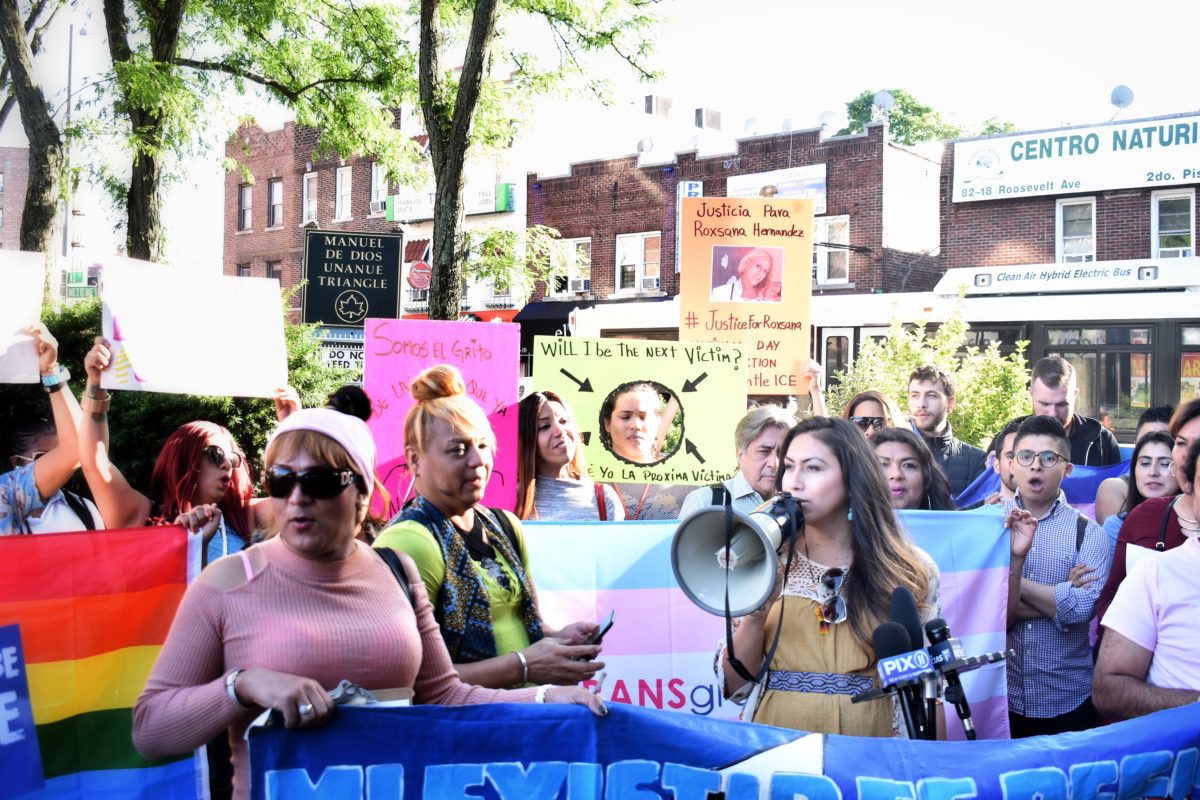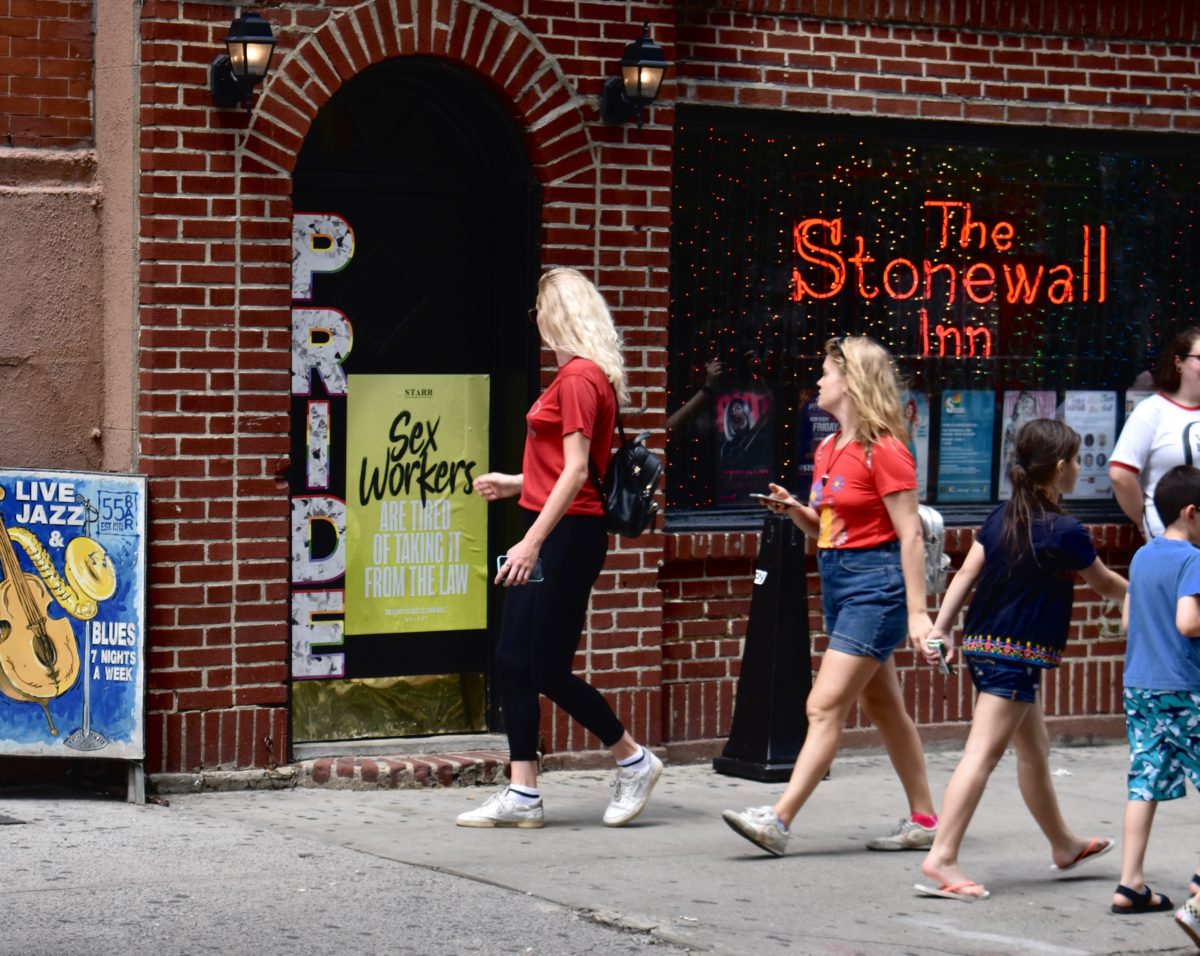‘The Police Act Like We Are Nothing’
A new coalition of people in the sex trades wants New York to become the first state to fully decriminalize their work.

This story was co-published with Gothamist.
Bianey García arrived in New York City from Mexico in January 2005, 14 years old, alone and without a warm coat. “It was difficult getting here with no family,” she said. “When I got here, I didn’t have anything.” A year later, she was homeless in an expensive city, and still living as a boy.
Then there was a man, she said. He brought her to a restaurant in New Jersey, she remembered, giving her chocolates and flowers, “telling me that he loved me, that he’d do everything for me.” She fell in love with him. She was living on the streets and in the subways, so when he offered her a place to live as his partner, “I thought, ‘Why not?,’ to feel safe, protected—but it wasn’t real.”
“At that time, I was scared of being deported, I was afraid of being arrested because of living in the street,” García, now 28, said. Yet the man coerced her into having sex with other men for money, she said, and giving the money to him. He threatened to call ICE on her if she refused.
García planned her escape from him, saving money from trading sex on the side, not telling him. Being on her own was hard, too. After she transitioned at 18, she had trouble finding other types of work as a trans woman. “I ended up doing sex work again,” she said. “I needed it to survive.” With that came the threat of police.
She recalled a warm night in 2008, on Roosevelt Avenue and 86th Street in Queens, when she was arrested for the first time along with someone she was dating.
“I was walking with my boyfriend,” she said, “and then an undercover police car stopped in front of us, and [the officers] pushed me to the ground and take my purse. They search my purse, they found condoms, and they used that as evidence of prostitution. Even when they was arresting me, my boyfriend told them we were in a relationship, and they don’t care. They said [to him], ‘You have to go, or you’ll be arrested.’”
That night, “I wasn’t doing sex work,” García said. While her boyfriend searched for her at the 110th Precinct, she was locked up in another jail. (A police spokesperson told The Appeal they could not find a record of her arrest.) After a few hours, she was released, and ultimately, the charges were dismissed, she said.
But the fear of arrest remained and became part of García’s reality. It stood in the way of the life she envisioned in New York. “The police act like we are nothing,” she said. It made her feel stigmatized, disbelieved, and ignored.
To be afraid of the police is real.
Bianey García Decrim NY
García wants more for herself and for other people in the sex trades, she told The Appeal. She is part of a new coalition that seeks to decriminalize sex work, one that has gained unprecedented momentum, and today, launches officially as Decrim NY.
Formed by people in the sex trades—whether through choice, circumstance, or coercion—Decrim NY links the fight for sex workers’ rights with a broader movement to end the criminalization of people of color, trans and gender nonconforming people, and low-income people in New York.
Over the last few years, the issue of decriminalizing sex work has moved into the mainstream—pushed in part by the passage of legislation that took aim at sex workers’ use of online ads and in turn sparked their highly visible and organized opposition. Prominent candidates for Queens district attorney, for instance—including Rory Lancman and Tiffany Cabán—have promised to, in some form, stop prosecuting sex workers. And state lawmakers just announced plans to introduce a bill to fully decriminalize sex work, in partnership with Decrim NY.
“Decriminalization has always been urgent,” said Nina Luo, a coalition member from the advocacy group VOCAL-NY. But the campaign has added urgency now because the legislative crackdown left people in the sex trades “in a more economically vulnerable place, which means criminalization and policing is having a larger impact on people’s lives,” she said.
Luo said the coalition’s goal is to “decriminalize, decarcerate, destigmatize.” That means repealing laws criminalizing sex work, restoring the rights of people who have been prosecuted for prostitution-related offenses, and ensuring all people in the sex trades can meet their basic needs, such as housing and health care, without discrimination.
This new coalition will almost certainly face opposition from law enforcement, but that’s not the only obstacle ahead. Its members will also have to contend with social service agencies and elected officials who believe the court system can help people who want to leave sex work or escape trafficking.
For Decrim NY, relying on arrests and courts to help sex workers exposes them to more violence while sending the message that they are people without dignity or choices in their lives.
Shifting law enforcement’s focus off sex workers and onto their customers doesn’t help either, they say. Decrim NY wants to banish law enforcement from the sex trades entirely. If it succeeds in fully decriminalizing sex work, New York would be the first state in the U.S. to do so.

García recalled the man who told her he would take her in, who made her think he could protect her. “That was the reason I found this person,” she said. “This is the reason we need to decriminalize sex work. Because as a sex worker or former sex worker, [then] I can go to the police, I can say, ‘Hey, this happened to me,’ not feel scared of getting arrested, or even deported. Because to be afraid of the police is real.”
Welcome to Queens
Queens, where García was arrested, has long borne the brunt of the city’s anti-prostitution policing, which disproportionately impacts women of color. Transgender Latinx sex workers, and those profiled as sex workers, are arrested on the streets of Jackson Heights, for example, and charged with “loitering for the purposes of prostitution.” Massage workers, predominantly of East Asian descent, are subject to police raids in Flushing.
Those raids have had deadly consequences. In 2017, 38-year-old Yang Song, an immigrant from China, fell from the window of a massage establishment on 40th Road in Flushing during a police sting.
Queens DA Richard Brown released a report in 2018 that placed no fault on police for Song’s death. “The death of Ms. Song is sad and tragic,” Brown said in a statement that accompanied the report’s release. “I have always maintained that prostitution is a degrading and humiliating industry.”
But advocates blame the raids of massage businesses. “Whether indirectly or directly, her death is on the NYPD,” said Red, now a member of Decrim NY, at the time.
Queens is also home to one of the state’s first Human Trafficking Intervention Courts, which supporters say are meant to spare people arrested for prostitution from being treated as criminals and instead treat them as victims of human trafficking. To that end, prosecutors in these courts make an offer of services rather than pursuing a criminal conviction. Under Judge Toko Serita, the Queens court came to be regarded as a model for the state’s trafficking courts.
“This court is not devised to solve the problems of trafficking,” Serita has said, “but to address one of the unfortunate byproducts, which is the arrest of these defendants on prostitution charges.”
Overall prostitution arrests in the city have decreased roughly 65 percent between 2012 and 2018, from around 4,000 to 1,500 per year, yet some vice policing is on the rise. Arrests for loitering for prostitution spiked 180 percent from 2017 to 2018, according to data obtained by the news site Documented, and half of those arrests were in Queens. (Despite a public records request made in June 2018, the Queens district attorney’s office has not provided The Appeal data on their prostitution-related prosecutions.)
According to The Legal Aid Society, which represents many New Yorkers charged with prostitution-related offenses, the upward trend in loitering arrests in Queens has continued into 2019, as have massage business raids.
In a statement, an NYPD spokesperson downplayed the frequency of such arrests.
“The NYPD works to end prostitution conditions and has shifted focus on enforcement operations to target pimps and johns primarily during anti-prostitution investigations and arrests, and on the closure of locations through civil action taken against landlords who are complicit in the illegal business of prostitution,” Sgt. Jessica McRorie said. “When arrests are made for prostitution, those arrested are delivered to a diversion court, where they are offered help and services in lieu of prosecution in criminal court.”

The disconnect between the NYPD’s stated focus and the experiences of sex workers is not lost on this year’s candidates for Queens DA. At least three candidates seeking to replace Brown, who is retiring, say people in the sex trades should not be prosecuted for that work, but their approaches to the issue differ considerably.
Rory Lancman, who leads the New York City Council’s Committee on the Justice System, has positioned himself as a reform candidate in the mold of Philadelphia DA Larry Krasner. In a recent interview with The Appeal, Lancman said he would continue to prosecute anti-prostitution cases involving sex workers’ customers and people who own or operate sex work businesses.
Advocates say Lancman’s language betrays a disdain for sex work. In a 2018 interview, he said the criminal justice system can help people in the sex trades to “break free” and “lead productive normal lives.”
The approach to decriminalization that Lancman supports is the one favored by the human trafficking court service providers like Sanctuary for Families, which backed the controversial SESTA/FOSTA law, targeting websites that sex workers use to look for work, in the name of fighting human trafficking. Manhattan DA Cy Vance joined Sanctuary for Families in support of the law.
Sanctuary often works in concert with anti-sex work lobbying groups such as World Without Exploitation, led by former Brooklyn prosecutor Lauren Hersh, who has served as Sanctuary for Families’s director of anti-trafficking policy and advocacy.
“I share the view of organizations that I work with that sex work is not good,” Lancman said, referring to those who provide services in the trafficking courts, “but that view has been shaped by those organizations.”
Supporters of this approach, known as the “Swedish model” or “End Demand,” include feminist author Gloria Steinem. She has called the continued criminalization of customers and third-parties “a third way,” a kind of compromise between full criminalization and full decriminalization. But members of Decrim NY say the goal behind it is no different from that of our current laws: to push women out of sex work, whether through criminalizing them or their customers, and to use police to do the pushing.
DA candidate Mina Malik, a former Queens prosecutor, echoed Lancman’s stance, saying she would prioritize prosecuting cases of human trafficking involving sex work. Borough President Melinda Katz, who is also seeking the seat, similarly said she would “focus on prosecuting the traffickers, brothel operators and other criminal elements who prey on people in dire situations.” Both said they believed people in the sex trades were often victims in need of services, and they would not prosecute them for prostitution-related offenses.
Our policies should be coming from community members that are directly impacted by them.
Tiffany Cabán candidate for Queens DA
In contrast, Tiffany Cabán, a public defender, supports full decriminalization, including for customers. Cabán said she hopes that declining to prosecute these offenses would provide evidence to state lawmakers in Albany that anti-prostitution laws are not necessary to protect public safety, and that these laws do not protect sex workers. If people in the sex trades experience violence, for instance, that can be addressed through other laws.
“You can still prosecute people for sexual assault, for any crime against a sex worker,” she said.
In the past, DAs have taken a “paternalistic approach,” she added. “We can’t do that anymore. … Our policies should be coming from community members that are directly impacted by them.”
Inside the courts
As recently as July 2017, the Queens trafficking court saw as many as 30 cases in a single morning, but this year, two days after Valentine’s Day, only a handful of people facing prostitution-related offenses were on the docket, intermingled with ones facing drug charges. Still, the benches in court were two-thirds full, with defendants in puffy black winter coats mostly on one side, and coatless attorneys and service providers seated on the other.
The court officers shushed the court, and Judge Serita took the bench. One court officer paced the center aisle, arranging the schedule of defendants charged with prostitution who had requested Spanish or Mandarin interpreters. Another court officer, with a brown and gray ponytail, called the cases. In the long pauses between cases, sometimes longer than the cases themselves, defense attorneys brought their clients into the hall to discuss their options. There were no white defendants.
A woman with a prostitution-related case stood when called, her pink appearance slip tucked in a tote bag. Serita greeted her through a Mandarin interpreter.
“I have a very good letter from Garden of Hope,” Serita said, referring to one of the court’s service providers, a domestic violence and anti-trafficking program with a Christian bent that focuses on the Chinese community. The letter meant the defendant had completed her mandated services and her case could be sealed in six months if she is not rearrested.

Serita doesn’t see such arrangements as pressure. “Nobody is coerced into any kind of program in this court,” she said in the middle of one case, more to the courtroom than to the defendant.
At the conclusion of such cases, Serita often tells defendants that their case will be sealed only if they “live a law-abiding life.” It may be a standard phrase for judges when giving out an adjournment in contemplation of dismissal, which defendants can get once they complete the court-mandated services. But in these courts, where the defendants are ostensibly “victims,” it sounds out of place.
Advocates with Decrim NY question that contradiction, in which defendants are simultaneously treated as victims and perpetrators. While judges and some service providers hailed the trafficking courts as a landmark reform, advocates say that providing services through the court system only perpetuates arrests.
Despite their name, Human Trafficking Intervention Courts don’t prosecute human trafficking, they prosecute people—mostly women, cis and trans—charged with prostitution, loitering for prostitution, or practicing massage without a license (a felony charge used against massage workers).
All the terrible arrests happen because there is money invested in the NYPD to do it.
Cecilia Gentili Decrim NY
Cecilia Gentili, a member of Decrim NY, has trained judges and social service providers in the trafficking courts on the realities that sex workers in the city face. She immigrated to the United States from Argentina in the early 2000s, and in her first decade in the country was a sex worker who also used drugs. She says the courts should treat people in the sex trades as the experts on their own needs.
“I have to go back to my own experience,” she said. “The first thing on that list was my undocumented status.” She also had to address substance use and mental health issues, and improve her English, she said. And she needed a place to live.
“I don’t know how much of that the court can do,” she said. “I’m glad that the courts are doing this work, but there are many more services that people in the sex trade need.”
Rory Lancman has long been supportive of the city’s human trafficking courts, and he has helped direct more than $2 million in city funding to them. He said about 1,300 defendants were served by the courts in New York City last year, which he considers a success because it keeps them from being “further enmeshed” in the criminal justice system.
Yet the courts have not provided public data on who those defendants were or how many of them were rearrested, nor does Lancman have this data. “I don’t know the recidivism rate,” Lancman said. “What is the lasting difference in their lives? I don’t know that that’s measured.”
Decrim NY wants the City Council to strip funding from vice policing and the Human Trafficking Intervention Courts and redirect that money to help people in the sex trades get what they need to survive, such as legal services, housing, and health care.
“All the terrible arrests happen because there is money invested in the NYPD to do it,” Gentili said. “It happens because vice is funded. If that money would be diverted to all these services that I spoke of before, the reality of sex work would be totally different.”
Changes in Albany
Decrim NY builds off other battles long waged by groups working for trans rights and sex workers’ rights. For at least a decade, for example, they have been fighting to end the use of condoms as evidence in New York.
In a 2012 report, Make the Road New York, an advocacy group, surveyed trans residents of Queens who said they were often stopped and searched by police, with police then justifying the search if condoms were found.
In 2014, then-Commissioner William Bratton announced that the NYPD would stop using condoms as evidence for some prostitution charges, which advocates greeted as only a partial victory. Police continue to list condoms as evidence on arrest sheets.
Some of the groups that have come together under the umbrella of Decrim NY were also part of the condoms-as-evidence fight: GMHC, the New York City Anti-Violence Project, Make the Road New York, the Sex Workers Project. They are joined now by such organizations as Womankind, which provides services in the human trafficking court, and Brooklyn Defender Services, which represents people charged with prostitution-related offenses, along with the Democratic Socialists of America NYC Queer Caucus, Survived and Punished, and the Sylvia Rivera Law Project, among others.
Jessica Raven, executive director of the Audre Lorde Project, is also a member of Decrim NY. She comes to the campaign from a similar effort in Washington, D.C., called DecrimNow DC.
Raven said Decrim NY is meant to encompass all “people in the sex trades,” a term that includes a broad range of experiences of people who have traded sex, whether they identify as sex workers, trafficking victims, or people who traded sex for survival.
“I didn’t identify as a sex worker. I was 15 when I was homeless, and I started trading sex—and I never talked about it,” Raven said. “That was just a strategy for meeting my needs.”

Part of the group’s approach involves pushing for legislation in Albany, with allies like State Senators Jessica Ramos, Julia Salazar, Brad Hoylman, and Assembly Member Richard Gottfried. Those lawmakers plan to introduce a comprehensive decriminalization bill to remove criminal penalties for “consensual sexual exchange between adults.” The coalition also urges quick passage of two bills already introduced in the state legislature that are getting newfound support.
One of those bills, introduced by Gottfried, would allow judges to vacate trafficking survivors’ past convictions, building off a 2010 law he sponsored. This new bill would expand the kinds of convictions that are eligible for vacature, from prostitution to any offense connected to their trafficking situation.
Gottfried said he supports the full decriminalization of sex work. “I think that is sensible public policy, and obviously, even on the left there are voices on both sides of that issue. But I think on the bottom line, whether you look at it as a civil liberties issue or an economic issue, I think it ultimately makes sense. And I think it’s exciting that this seems to be the moment of public debate when it can be seriously advanced.”
While decriminalization-related bills have failed in the state legislature in the past, Gottfried said the 2018 election was a game-changer. “With a Democratic majority in the state Senate, and such a large number of legislators in both houses who are younger women of color, that really changes the prospects for legislation on this issue and makes it a lot more likely than ever in the past.”
Salazar and Ramos are among the new class and both represent districts in New York City among those where prostitution laws are most severely enforced, including Jackson Heights, East New York, and Bushwick.
Salazar made repealing the loitering for prostitution law part of her campaign last year, as did sex workers who canvassed on her behalf. Now in office, she has co-sponsored a bill to do that, which was first introduced by Senator Hoylman.
I think it’s exciting that this seems to be the moment of public debate when it can be seriously advanced.
Richard Gottfried New York State Assembly member
Meanwhile, outside pressure to repeal the law has been building. A number of women convicted of loitering for prostitution sued New York City in 2016, charging that the law was unconstitutional. The suit brought attention to race- and gender-based profiling in loitering policing, drawing comparisons with the city’s “stop-and-frisk” policy.
Lately, Legal Aid has noticed that when police make loitering arrests, officers are submitting more detailed reports about what they say they witnessed. In one case from December 2018, an officer claimed a woman he arrested in Queens told him, “I’m over there working, sir. I am loitering.” In another arrest that same month, police wrote that they observed a woman in Jackson Heights who had—impossibly—“exposed her cervix area.”
“It’s awful that they [the police] seem to be making things up,” said Salazar, “but on the other hand, it’s interesting and perhaps in a way indicates some progress on the side of advocates, that officers are now feeling the need to justify these arrests.”
Ramos supports repealing these laws because the people the laws often target have also been leaders on decriminalization for a long time—including trans Latinas, she said, like Bianey García. “I think we would be doing a disservice to them to say [the growing momentum is] exclusively about the political climate,” she said.
Like Salazar and Gottfried, Ramos supports full decriminalization of sex work. “I have a big concern with the arrest of johns,” she said. Especially when any police interaction carries with it possible ICE involvement, she said, “It’s very concerning in my district.”
Ramos said that sex work traditionally has been a controversial topic for lawmakers, which is unfortunate. But this year, she added, with Republicans having lost control of the state legislature, “It’s a new day.”
Building a movement
Earlier this month, one gray afternoon, slush piled on the sidewalks and street in Lower Manhattan. A few blocks from City Hall, in a small conference room at the New York City Anti-Violence Project with the heat blasting, Bianey García reclined on a beanbag chair, wearing a rose-gold faux fur jacket over midnight blue capri pants, her dark hair pulled back in a soft bun.
García took a moment to scroll through her phone. A few dozen activists from Decrim NY filled the room. They all, including García, had just attended an invitation-only roundtable meeting convened by City Council Speaker Corey Johnson’s office with members of the council’s women’s caucus. Advocates were told that the meeting was meant to discuss helping sex workers find services, not “debate” decriminalization.
I always say that sex work is work. It’s not easy—just leave us alone.
Bianey García Decrim NY
Now the activists—some of whom were also sex workers, or had been sex workers—were debriefing about the discussion. Members of Decrim NY had explained that it was not possible to improve access to services for sex workers in New York without first addressing policing as a source of harm to them.
But some service providers present didn’t want to talk about police, said Gentili, who was until recently head of policy at GMHC (one of the oldest HIV/AIDS care and prevention providers). These providers seemed to see the police as helpers. Contacted by The Appeal, one of the groups named, Sanctuary for Families, did not respond to a request for comment.
Gentili balked at the idea that the police could be trained to be more sensitive. “Maybe you can train them for a hundred years, and in a hundred years there will be a group of officers who have a better understanding … but we need these changes now,” she said. Gentili said that as a sex worker in New York, she had been arrested many times. “I know what I’m talking about. I’ve been there.”
Though Decrim NY members got policing and criminalization on the agenda, they had to fight to do so, said Luo. If they hadn’t been there, she said, “the table would have been overwhelmingly advocates with zero lived experience on the issue.”
When it comes to what the police should do, Bianey García said, ”I always say that sex work is work. It’s not easy—just leave us alone.”
García said she only found the help she needed well after her last arrest when she met advocates from Make the Road New York, a group that is now part of Decrim NY. Then she became an advocate herself.
That last time she was arrested, said García, was in October 2009. It was around 3 a.m. in Queens and she and a friend were waiting for García’s boyfriend so they could go to a club. At Roosevelt Avenue and 94th Street, they were accosted by a man hurling homophobic slurs at them. The man began beating García’s friend, so García pushed the man and picked her friend up off the ground. The man followed them, even as they crossed paths with a police car. “We tried to explain to the officer that he was attacking us,” she said, but ”the guy started to explain to the police we attacked him.”
García said she and her friend were arrested and she spent 18 months locked up on Rikers Island. While working to resolve that case, she discovered the Sex Workers Project, which provides free legal services to people in the sex trades. García learned that as someone who had been trafficked, she was entitled to a T-visa, which enabled her to legally remain in the United States. And after that, she joined Make The Road.
With all she had experienced, “I wanted to change the law,” she said. “I wanted to change the police.”
